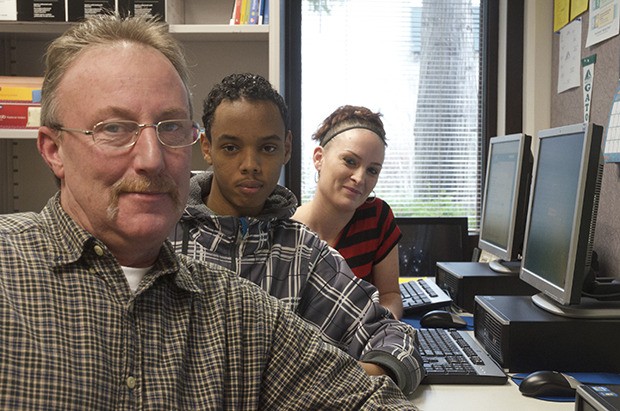When Angela “Spunky” Robinson’s mother and uncle died in 2000, she couldn’t remain in her home state of South Carolina and left on a cross country trip, arriving in Federal Way in 2007.
Having known little more than a life of minimum wage jobs, she took a class at Green River Community College to become certified as a road flagger.
But once on campus, Robinson realized she could attend school on federal funding and jumped at the chance. She had missed out on a large part of her education, so before she could take the information technology classes that would eventually secure her a stable job at the college, she had to get her GED.
“I had never been to high school, so those classes got me up to speed on everything I missed there,” said the 37-year-old Robinson, who now works as an IT instructor at GRCC.
Through the college’s Language Academic Skills and Wellness (LAW) Division, Robinson was able to get her basics taken care of while still taking math classes that would count toward an associate degree. The navigating forms, class schedules and degree requirements can be a trial for anyone new to the system, and can take almost as much time as studies do.
To respond to this, the college established two programs — Integrated Basic Education and Skills Training (I-BEST) and Master Achiever Center (MAC) — to help students who lost their first chance at an education back into the system.
Former dean Laura Dizazzo started the programs through a grant from CollegeBoard’s Washington office. The programs assist three different types of students: those who are lacking in certain skill developments, those with English as second language learners and those earning their GEDs.
“Honestly, I don’t think the students could deal without the programs,” Robinson said. “There’s not a lot of resources that students can go out of the school and find.”
“When people come to college, really, it’s hard for everyone,” said I-BEST director Cynthia Gaede. “Those students, our largest number, in ESOL (English for Speakers of Other Languages) are working age, between 21 and 44. So they almost all have families.”
Most of the students have families and careers and are working their way toward developing new skills. Unfortunately, the responsibilities of raising a family and maintaining a job make it difficult to sort through academia, and that’s where the MAC comes into play.
“We really try to engage the students in conversations about what they’re good at,” said Bev Baker, a Green River instructor. “Especially people who were GED students who may have beliefs about themselves that they’re not good at anything, but really they actually are.”
So the MAC counselors work to find those students strengths and find them programs that build on that. The center also provides classroom assistance, such as explaining academic basics to students who are new to the system.
“Instructors go over things like the syllabus or the textbook, but for some people, they need to have a page by page, so who’s got that time? Well, the MAC does,” Gaede said.
The programs tie into a running theme for the college to provide re-engagement opportunities to adults who didn’t get a chance to get a degree the first time around, or have immigrated to the U.S. and need a boost for reading and writing skills.
The classes focus on supporting basic skills like writing and reading as well as technical classes to move them towards a career. For some students, this might be remedial classes in deficient skills such as high school level math to take alongside a college mechanical class. For others, such as ESL student Nimo Abdi who takes basic english classes along with her advanced math classes.
The other side of this plan for the college is the MAC, which helps with the logistical side of the process. It helps students process their paperwork, navigates schedules and otherwise provides them with the assistance they need to weave their way through the complex bureaucracy of the educational system.
“It’s an evening of the playing field,” Gaede said. “We happen to work with a particular population who struggle.”
Talk to us
Please share your story tips by emailing editor@kentreporter.com.
To share your opinion for publication, submit a letter through our website https://www.kentreporter.com/submit-letter/. Include your name, address and daytime phone number. (We’ll only publish your name and hometown.) Please keep letters to 300 words or less.

